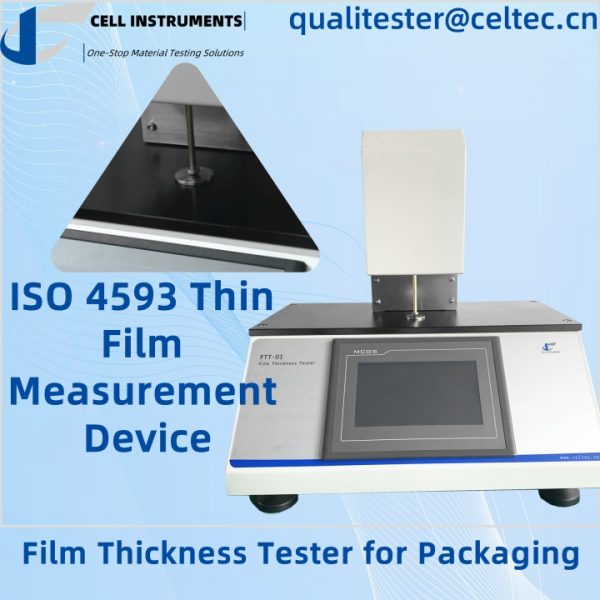Film Thickness Tester for Packaging: Ensuring Compliance with ISO 4593
The quality and consistency of packaging materials are key factors that affect product integrity, customer satisfaction, and regulatory compliance. Among the many parameters that need to be controlled, film thickness plays a vital role in ensuring that packaging materials perform as expected. Film thickness tester for packaging are important tools in quality control systems that help manufacturers meet industry standards such as ISO 4593. This article will explore the importance of film thickness testing, relevant standards, and the advantages of using advanced testing instruments.
Importance of Film Thickness Testing
Film thickness is a fundamental property of packaging materials that affects its durability, flexibility, barrier properties, and overall performance. Thickness variations can lead to problems such as inconsistent protection, poor print quality, and increased material costs. Therefore, accurate thickness testing is essential to maintain product quality and optimize material usage.
In industries such as food and beverage, pharmaceuticals, and electronics that require strict compliance with regulations, ensuring consistent film thickness is not only a quality issue, but also a compliance and safety requirement. The ISO 4593 standard specifies methods for measuring the thickness of plastic films and sheets and is widely adopted to ensure reliable and comparable measurements across laboratories and applications.
Key Standards: ISO 4593 and ASTM D374
The ISO 4593 standard outlines the procedure for determining the thickness of plastic film and sheeting and is particularly important to the packaging industry, as the thickness of the film can affect the barrier properties of the packaging. Following the ISO 4593 standard ensures that the measurements are accurate, repeatable, and consistent.
In addition to ISO 4593, ASTM D374 is another standard that regulates film thickness measurements, especially for thicker materials such as aluminum foil and certain plastics. The combination of these two standards provides a comprehensive framework for the quality and consistency of packaging materials.
Advanced Film Thickness Testing: Key Features
Modern film thickness testers are designed to meet the demanding requirements of today’s packaging industry. Benchtop film thickness testers such as the Cell instrument have several advanced features that increase accuracy, ease of use, and versatility.
- High Precision and Accuracy: These testers use advanced sensor technology to provide reliable measurements with minimal deviations, which is critical for consistency in quality control processes.
- Intuitive Software and User-Friendly Interface: Testers are often equipped with a PLC and HMI touch screen for easy operation. Real-time data display and automatic sample feeding options further simplify the testing process.
- Versatility: A wide range of materials such as films, foils, paper and paperboard can be measured for a variety of applications in different industries.
- Customization: The instrument can be customized for special testing requirements, such as adjusting the measurement range or integrating into an automated system.
Application
The application of film thickness testing spans across multiple industries, each with specific requirements:
- Packaging Industry: Consistent thickness is essential to ensure the durability and performance of packaging materials, especially to protect the contents during transportation and storage.
- Food and Beverage Industry: Accurate film thickness ensures that packaging materials have sufficient barrier properties to keep products fresh and safe.
- Medical and Pharmaceutical Industry: In these highly regulated industries, accurate thickness testing is essential to meet safety standards.
- Adhesives and Textile Industry: In these applications, materials must adhere correctly or maintain specific mechanical properties, so uniform thickness is essential.
Advantages of Using Thin Film Measurement Device
Cell Instruments’ benchtop film thickness testers are designed to meet the needs of different industries. With high accuracy, intuitive operation and a wide range of applications, they are the ideal choice for companies to ensure the quality and compliance of packaging materials.
By following international standards such as ISO 4593, the instrument helps manufacturers maintain consistent product quality, reduce material waste, and meet regulatory requirements.
FAQ
Why is film thickness important in packaging?
Film thickness affects the durability, barrier, and overall performance of packaging materials. Consistent thickness ensures product protection and regulatory compliance.
What standards are used for film thickness testing?
ISO 4593 and ASTM D374 are the main standards for film thickness testing, ensuring accurate and repeatable measurement results.
How does a film thickness tester work?
Film thickness testers use sensors to measure the distance between the film surface and a reference point. Displacement methods are often used to achieve high accuracy.
What materials can film thickness testers test?
Film thickness testers can measure a wide range of materials, including plastic films, foils, paper, and paperboard, making them suitable for a variety of applications in different industries.
How can I ensure the accuracy of my film thickness tester?
Regular calibration using standard blocks and following the test procedures specified in ISO 4593 and ASTM D374 ensures accurate measurements.
Related Products
Benchtop Film
Thickness Tester
Related Article
Lab
Thickness Tester for Paper
Thickness
Tester for Thin Films
Bench
Thickness Tester for Textile
Thickness
Tester Machine for Textiles
Reference

